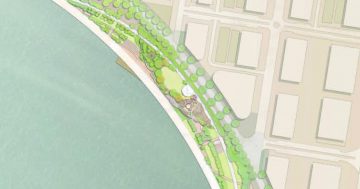
Music lovers at Groovin’ the Moo. Music festivals are big moneyspinners for the ACT. Photo: Groovin’ the Moo.
Live music in key outdoor venues may have to dial the volume down or pull the plug altogether if residents in new urban infill developments can complain about noise, according to the ACT’s music lobby.
In a submission on the proposed variation of the Territory Plan to allow the 2000-home Kamberra development near Exhibition Park, Music ACT says that in the current planning environment, any clash between live music and residents is likely to end in the latter’s favour.
It says that without a clear statement of protection from the ACT Government, EPIC, which hosts the National Folk Festival and the Spilt Milk and Groovin’ the Moo music festivals, could become unviable for promoters.
Music ACT says the other outdoor venue close to the city, Stage 88 in Commonwealth Park, was also facing the same situation, with residential development planned for the nearby Acton Waterfront putting unit owners in direct line of sight of the park.
Music ACT director Daniel Ballantyne told Region that even with the government having an Entertainment Action Plan and being close to establishing the ACT’s first Entertainment Precinct in the city, the music industry fears that without a firm legislative framework, its needs will be drowned out by those of developers and the people who buy apartments from them.
Mr Ballantyne said the industry was already dealing with such scenarios in Braddon, and Canberra is being overlooked for major arena-scale events.
“Canberra is not experiencing anything like the level of stadium and arena scale events that it used to and this has not come about through accident,” Mr Ballantyne said.
He believes music festival promoters will go elsewhere if confronted with restrictive noise levels.
He said both festivals and touring concerts were vital to the local industry, which supplied undercard performers, technical support and staff.
“The prospect of a career in this city is very limited,” Mr Ballantyne said. “We will never have a viable music industry if we are blind to the opportunities that come from festivals and large touring acts.”
He said Spilt Milk alone had contributed $55 million to the ACT economy, not counting last year’s event attended by an estimated 45,000 people, of whom around 34,000 were from outside the ACT.

Spilt Milk in 2019 at Stage 88. Festivals such as this are crucial for the local music industry. Photo: Spilt Milk.
Mr Ballantyne said it was up to the government to develop a planning framework so festivals could be staged successfully, including design requirements for developers such as triple glazing, as is the case in the Fortitude Valley special entertainment precinct in Brisbane.
“We should be able to present the largest possible festivals in the best possible locations in our city centre,” he said.
Mr Ballantyne acknowledged there were a lot of competing interests inside and outside of government.
“On one level, the government is very keen for Canberra to shake off its image of a dead town after 10 pm and to see a flourishing cultural industry, in particular contemporary music,” he said.
“What you’re up against is a history of territory planning that has been incredibly conservative and generally favoured developers who are into develop and get out.
“They don’t necessarily design or develop their precincts, with the exception of one or two, around the prospect of vibrant entertainment and night-time economy and culture.”
Mr Ballantyne said residents should be clear-eyed about where they propose to live.
“Move in knowing that you are going to be living adjacent to a massive public economic and social and cultural infrastructure resource, and if that’s not to your liking, you need to find somewhere else,” he said.
An ACT Government spokesperson said Draft Variation 383 which proposes to rezone the former Kamberra winery site includes requirements for any future development to consider the noise impacts from EPIC and Thoroughbred Park.
An acoustic assessment and Noise Management Plan (NMP) endorsed by the EPA was required that provides protection from external noise sources including EPIC and Thoroughbred Park.
Residential and commercial accommodation would not be permitted within 100 metres of the eastern boundary across from EPIC and 100m from the Thoroughbred Park boundary.
The spokesperson said a range of locations across the ACT would be considered as potential entertainment precincts, including EPIC.
The Better Regulation Taskforce was also working to identify changes to legislation and regulatory practices that optimised settings for businesses in the night-time and entertainment economy.
A City Renewal Authority spokesperson said the Acton Waterfront development would not prevent music festivals and concerts at Stage 88.
“Acton Waterfront is being planned so that it enhances lakefront activation, connects the city to the lake and encourages more people to spend more time at the lakefront. Regular events and attractions will be essential to this neighbourhood,” the spokesperson said.
“All development in the Acton Waterfront precinct must meet the statutory planning requirements of the National Capital Plan, which also includes Commonwealth Park, and will be subject to planning approval by the National Capital Authority.
“The City Renewal Authority is consulting with the National Capital Authority on the estate plan to ensure it seamlessly integrates with the surrounding area.”
The NCA, which manages Commonwealth Park and will be the approving agency for Acton Waterfront, said ensuring developments had acoustic privacy appropriate to a location was a normal part of any development and this would be considered part of the assessment process as proposals are submitted.
The NCA is looking to revamp the Park, partly so events can be staged more successfully. It said it would be consulting with the community and key stakeholders, including the ACT Government, every step of the way.





















